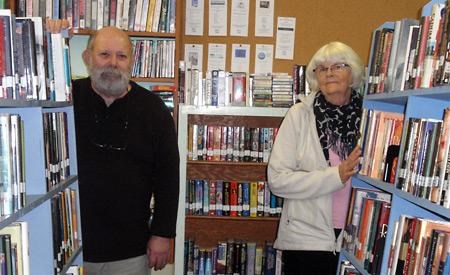by Sandy McCormick While it isn’t fair to judge a book by its cover, the same is not true for libraries.
When Anne Carney and Dick Turner each moved to Texada Island, the island’s library was not well organized. Piles of books and other materials were stacked in no particular order. It was next-to-impossible to find anything, they recalled.
Together with a valued team of dedicated volunteers, they transformed the once-ratty, dogeared collection into a properly-shelved, well-categorized library with sections for all topics of interest, including new acquisitions, based on the traditional Dewey Decimal System.
Both Carney and Turner know how important a library could and should be to a community. Both had professional library experience and their passion and leadership inspired Texada’s informal library group to make the island’s collection “the best that it can be.”
Carney, 75, the library coordinator, moved to Texada in 2005 and started as a casual library volunteer a year later. Growing up in Saskatchewan and Kamloops, she loved reading as a pastime. She trained as an X-ray technician, working in radiography at St. Paul’s Hospital in Vancouver. After living in Tokyo, where it was difficult to find English language material, and raising a family, she returned to Vancouver and worked for the Vancouver Public Library (VPL), ending her career as supervisor of “quick information services,” where people brought questions and staff would find the answers.
Turner, 69, Texada’s librarian, grew up in a then-rural part of Surrey, where there was no library and the family could not afford “luxuries” like books. After living in Tanzania in the early 1970s, where he was a computer programmer for the government’s ministry of finance, he returned to Vancouver and earned a master of library science degree from the University of British Columbia. Turner then became a VPL branch head at the Carnegie Reading Room in the city’s Downtown Eastside. He retired to Texada in 2008 and, after volunteering as a casual at the library, was soon recognized as someone with actual experience in running a library.
They began by organizing Texada’s collection, sorting materials by age and condition. They held a huge book sale to make more space, put in proper shelving and categorized books, magazines and audio-visual materials into an easy-to-find system. A 2009 addition to the old school building in Gillies Bay, which houses the library, enabled the collection to double in size.
“We worked on bringing in more up-to-date materials and making the place look and feel like a library,” said Carney. “That alone brought more people in.”
From donations and book sale revenue, the library began purchasing books “to fill in the holes” in the collection. “We put a lot of thought into what to buy,” said Turner. “We reviewed what people took out or asked for and purchased materials that people wanted. We set a profile of island needs and worked to meet them.”
The current purchasing focus is on hardcover and trade paperback books. Once a year they go through the collection, weed out books that haven’t been borrowed and discard dated or damaged materials. These are sold and the revenue is used to purchase new books.
The Texada library is open daily for several hours per day and circulation is increasing. “Our goal is to have something for everybody,” Turner said.
Carney wants to see more events at the library, such as open houses, more author readings and children’s storytime. “We’ve come leaps and bounds and we’ll continue to make the library more accessible for people to use,” she said.
As well as printed material, the library houses two computers and a printer which are available for public use. Sometimes people bring their own laptops to use the library’s WiFi for Internet access, or sit outdoors to use the WiFi when the library is closed.
On average, the library checks out 20 items per day with summers being busier than winters because of visiting family members and tourists. Carney says the most popular categories of books are about gardening, cooking, the Pacific northwest, mysteries and fiction.
The library receives financial assistance from Powell River Regional District and its rent is paid by Powell River Public Library, which also loans Texada books for several months at a time.
Turner said their biggest challenge is space. “The library is still small in size with no workroom or storage area.” He wants to establish a mobile service for housebound people and to find more ways to reach young adults in the future.



